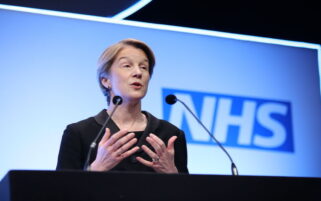Pilots of new ways of working for GP practices – modelled on the Fuller stocktake – will be ‘integral to the future of the NHS’, according to NHS England’s chief executive.
Amanda Pritchard was speaking at the NHS Confederation Expo in Manchester last week when she said that the NHS needs ‘a modern vision for primary care’, and that pilots coordinated by ICBs across the country to test new ways of working for practices will be vital.
Last month, NHS England announced that seven ICBs will test new ways of using ‘more flexible staffing models’, data and process automation within general practice in a pilot scheme that could change the way the profession works. This work will ‘further deliver’ on the 2022 report by GP and NHS national medical director for primary care Dr Claire Fuller, they added.
However, Ms Pritchard said: ‘We need a modern vision for primary care. And two years ago, Claire Fuller gave us one: streamlined access to urgent care or advice, proactive personalised care for patients with long-term needs and helping people to stay well for longer. It’s a vision we can all get behind.’
She said that the first pilots are now exploring ‘the big questions’ around how to ‘make it easier for practices to meet urgent demands’ alongside continuity of care and preventative work.
And Ms Pritchard added that she ‘knows there is no shortage of ambition among GPs and their teams’ in bringing about innovation, citing the example of services at Ancoats Urban Village Medical Practice in Manchester, which she visited earlier in the year.
‘I heard there from an incredible practice manager about how they were delivering responsive urgent care to a large population,’ Ms Pritchard told the conference.
‘But I also saw the work they were doing to prevent need developing. Their data showed that homeless women faced the most serious health inequalities and just weren’t coming into the surgery. So, they bought a van. They kitted it out. And they worked with homeless charities to offer sexual health services where those communities were – where they are, using the opportunity to identify people who then needed more help.’
There are countless examples like that across the country, Ms Pritchard said: ‘We want the ambition they show to be the norm, and it can be if we give primary care the tools they need.’
In a separate session at the conference, NHS England’s national director of primary care Dr Amanda Doyle also mentioned the pilots, which she said are ‘not a top-down NHS England thing’, rather that the commissioner is working with ICBs to ‘test out some hypotheses’.
The ICBs involved in the pilots are:
- Humber and North Yorkshire
- South Yorkshire
- Gloucestershire
- Somerset
- North Central London
- Lincolnshire
- Suffolk and North East Essex
Dr Doyle said: ‘They’re not pilots in the “try a new thing and evaluate it in two years and see if it works”. They are test sites, and will be 15 or so PCN-sized groups of practices or PCNs, that are testing out some hypotheses we’ve got and are essentially about getting information that we need to understand what that gap between demand and capacity is.’
She added that the pilots aimed to test what happens if general practice ‘works at sufficient scale’.
She said: ‘If NHS England stops trying to micromanage everything general practice does, if we try to meet what we think is the core capacity gap – and that’s financial as well as everything else – if we optimise everything else we can and, particularly, we’re talking about the use of digital tools and some of the newer tools that are just being tested, then is general practice able to sustainably deliver the on-the-day demand, high quality, long-term condition management, the stuff we need to be doing around improving population health management, and proactive care for the people with the most complex needs?
‘Is that all doable and sustainable, and what would it take to do that?’
The Fuller stocktake, a landmark review on integrating primary care with other NHS services, recommended that GP practices form ‘single urgent care teams’ across ‘neighbourhoods’ to improve patient access.
It also laid out plans to develop ‘innovative employment models such as joint appointments and rotational models’ to counter the GP workforce crisis.



